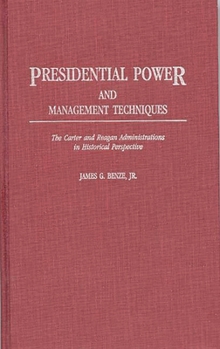Presidential Power and Management Techniques: The Carter and Reagan Administrations in Historical Perspective
(Book #175 in the Contributions in Political Science Series)
An evaluation of presidential efforts to achieve greater control over policy implementation by intransigent federal bureaucracies. Benze asserts] that Ronald Reagan's use of budget cuts and appointment of conservative ideologues tended to enhance presidential power more readily than attempts at bureaucratic reorganization. Based on mail surveys of more than 350 domestic administrators, the author concludes that bureaucratic acceptance of management techniques requires the kind of persuasive political skills Reagan displayed in his first term, but were lacking in the Carter Administration. He cautions that Reagan's managerial initiatives engendered morale problems, and may lack institutional permanency in the absence of constitutional and statutory changes. . . . A useful addition to upper-division and graduate collections. Choice
Professor Benze's new study looks at the historical trend toward centralization of policy implementation in the president's office and shows how--and with what degree of success--the Reagan and Carter administrations have met this problem. Among the important features of the book are the wealth of empirical data provided on the presidency and the analysis of both change and continuity between administrations in the handling of specific management areas.




